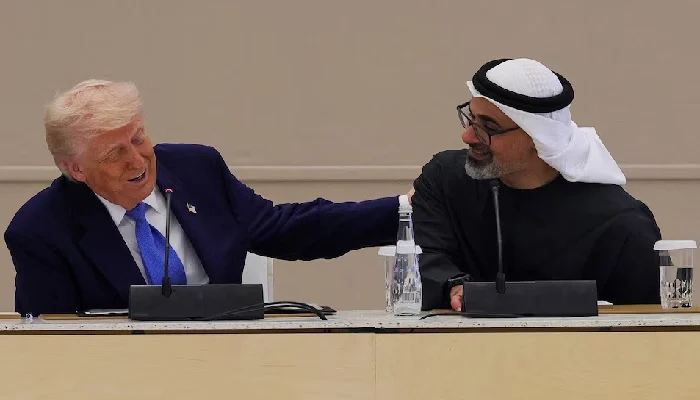President Donald Trump announced on Friday that the United Arab Emirates and the United States have agreed to establish a pathway for the Gulf nation to purchase some of the most advanced artificial intelligence semiconductors from American companies, a significant achievement for Abu Dhabi’s ambition to become a global AI hub.
Trump concluded his Gulf tour of Saudi Arabia, Qatar, and the UAE with a pledge from Abu Dhabi—the UAE’s capital and wealthiest emirate—to increase its energy investments in the US to $440 billion over the next decade.
He committed on Thursday to strengthening US-UAE ties, unveiling deals totaling over $200 billion, including a $14.5 billion investment from Etihad Airways in 28 American-made Boeing aircraft.
“We work together and the money that’s made here comes back to us,” Trump stated to Abu Dhabi Crown Prince Sheikh Khaled bin Mohamed bin Zayed during a press conference in Abu Dhabi, highlighting the robust business relationship between the US and UAE.
“We’ve made it work, and you know they were being wooed by others. But there’s no more wooing, I think we’re in pretty good shape,” he added.
“Absolutely,” the crown prince responded.
The AI agreement, finalized on Thursday, represents a major boost for the UAE, which is navigating a delicate balance in its relations with its longstanding ally, the US, and its largest trading partner, China.
It reflects the Trump administration’s confidence in the secure management of these chips, partly through the requirement that US companies manage the data centers.
“Yesterday the two countries also agreed to create a path for UAE to buy some of the world’s most advanced AI semiconductors from American companies, a very big contract,” Trump emphasized.
“This will generate billions and billions of dollars in business and accelerate the UAE’s plans to become a really major player in artificial intelligence,” he added.
Energy Investments
The UAE’s energy investment commitment was revealed during a presentation by Sultan Al Jaber, CEO of Abu Dhabi’s state energy giant ADNOC, to Trump during the concluding stage of his regional tour, which garnered substantial financial pledges from the UAE, Saudi Arabia, and Qatar.
Al Jaber informed Trump that the enterprise value of UAE investments in the US energy sector will surge to $440 billion by 2035, up from the current $70 billion, adding that US energy firms will also invest in the UAE.
“Our partners have committed new investments worth $60 billion in upstream oil and gas, as well as new and unconventional opportunities,” Jaber stated, referencing a slide showcasing projects in the UAE under the logos of US companies ExxonMobil, Oxy, and EOG Resources.
XRG, ADNOC’s international investment arm, is pursuing significant investments in US natural gas, according to Jaber, who also serves as XRG’s executive chairman and minister of industry and advanced technology.
In March, during a meeting between senior UAE officials and Trump, the UAE committed to a 10-year, $1.4 trillion investment framework in the US, spanning sectors such as energy, AI, and manufacturing, to strengthen bilateral ties.
“We’re making great progress for the $1.4 (trillion) that UAE has announced it intends to spend in the United States,” Trump noted during his final stop on a Gulf tour that primarily focused on investment deals, rather than regional security crises, including the Israeli-Palestinian conflict.
However, Trump did engage in some diplomatic efforts during his meetings with major energy producers.
He met with Syria’s new interim President, Ahmed al-Sharaa, in Riyadh and expressed his intention to lift sanctions on Syria at the request of Saudi Arabia’s crown prince, a significant shift in US policy.



